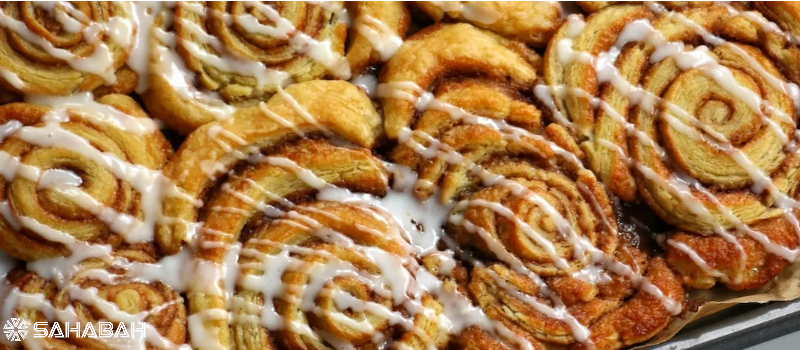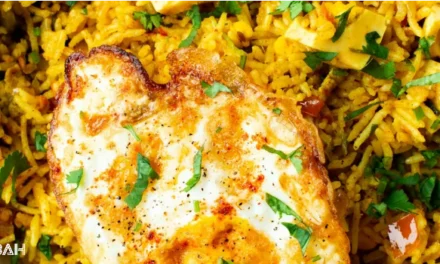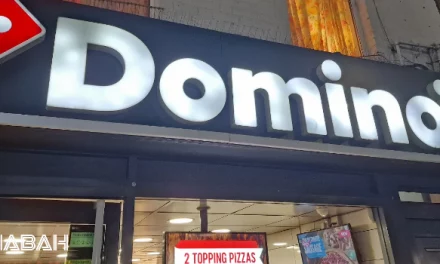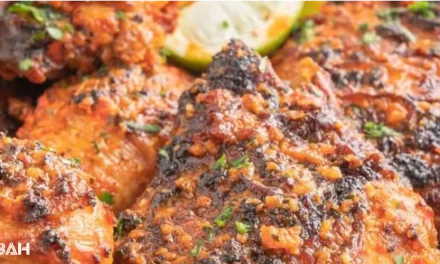Cinnabon – the beloved bakery chain renowned for its mouthwatering cinnamon rolls dripping with sweet frosting – has outlets across the globe. But can Muslims safely enjoy these tantalizing bakery treats or are they considered haram? This comprehensive article will thoroughly analyze Cinnabon’s ingredients, menu offerings and store policies to determine if their products are halal-certified or suitable for a halal diet.
A Brief History of Cinnabon – The Famous Cinnamon Roll Chain
Cinnabon first opened its doors in 1985 in Seattle, Washington. The brainchild of restaurateur Rich Komen and pastry chef Jerilyn Brusseau, it aimed to introduce the world to American-style cinnamon rolls made from Makara cinnamon. Their classic Cinnabon cinnamon roll consists of yeast dough topped with a rich cream cheese frosting.
Over the years, the company expanded internationally and now has over 1,200 Cinnabon bakery locations worldwide. It also diversified menu offerings beyond cinnamon rolls to include baked goods like pecanbon chocolate cookies, cinnamon streusel muffins, caramel pecan iced lattes and lemonade freezes.
Today, the Cinnabon brand is renowned as the cinnamon roll authority. Its creativity even extends to special seasonal products like pumpkin spice loaf cake and hot chocolate cookie bonbons. However, with growing Muslim consumer populations across Asia and the Middle East, questions around whether Cinnabon meets halal regulations arise.
Checking Cinnabon Ingredients for Halal Compliance
For food to be certified halal, it must comply with Islamic dietary regulations outlined in the Quran. This means abstaining from alcohol, pork products and improperly slaughtered meat. Animal-derived ingredients like dairy and eggs are permissible, but they must come from halal slaughtered sources.
When examining the Cinnabon menu, they utilize common baking components like wheat flour, yeast, butter and eggs rather than any blatant haram products. According to direct consumer inquiries, none of their menu items contain alcohol or pork by-products either.
However, since there are over 1200 franchise locations, ingredients can vary slightly across regions. The official website states that Cinnabon does not issue any halal designations or guarantees. Determining halal compliance depends very much on specific location practices.
“I contacted the Cinnabon consumer information line about halal certification. They informed me that ingredients are supplied based on local sourcing and regulations. So Muslims would need to check with their city or country’s Cinnabon directly,” shares Amir, a halal food blogger.
Let’s analyze some of the most common Cinnabon menu items that Muslims enjoy:
Classic Cinnamon Roll
The star of their menu – this icon serves as the perfect introductory treat to the bakery chain. With it’s recognizable swirl shape, it features a yeast-leavened dough topped with rich Makara cinnamon sugar that is then slathered in a decadent cream cheese frosting.
The classic roll has no apparent haram ingredients listed. As long as the dairy components used pass halal slaughtering standards, it should comply with Muslim dietery restrictions. However, verifying the halal status with your local store is still recommended.
Frosting
Cinnabon’s signature frosting accompanies nearly all menu items. But according to some obscure nutrition regulations online, it may contain small amounts of beef fat for extra richness. This non-halal animal fat would prohibit observant Muslims from consuming it.
Requesting an alternative icing or frosting is highly encouraged. Locations often have dairy-free substitutions or may be willing to make a customized batch. Do also inquire about the dairy sourcing itself to check if local milk and cream pass halal regulations.
Caramel Pecanbon Chillatté
This chilled coffee drink combines cold brew with sweet caramel sauce, cinnamon dolce syrup and creamy milk. It is then topped with whipped cream and crunchy pecan pieces.
On its own, the Chillatté appears suitable for halal diets. But because franchises can tweak recipes individually, always verify that your location does not add rum or other alcoholic flavorings which would make it haram.
Chocolate Pecanbon
This rich bakery treat starts with chocolate cookie dough, topped with chocolate morsels and drizzled with a sweet brandy glaze then finished with chopped pecans.
The main concerns about halal suitability come from the brandy glaze. Brandy refers to a strong spirit distilled from wine or fermented fruit juice, making it decidedly alcohol-based and non-halal.
Ordering it without the brandy glaze seems to be the best approach for Muslims. Do also check if your local Cinnabon uses real brandy or just brandy flavoring, which may be haram or halal depending on its alcohol content.
In summary, while no Cinnabon food products are officially halal certified, many menu items can likely be adapted to suit Muslim religious needs through ingredient substitutions, removals or preparation adjustments. Checking directly with store management is always advisable.
According to Sara, a enthusiastic Cinnabon patron:
“I’m a loyal Cinnabon lover and was really hoping their cinnamon rolls would be halal. The location near my house let me know their classic rolls use dairy from properly slaughtered cows and they sanitize equipment between orders. Definitely always ask questions first so accommodations can be made!”
Now let’s explore general Cinnabon procedures surrounding halal food preparation and cross-contamination avoidance.
Cinnabon Store Policies for Halal Preparation
As a franchise model, rather than a fully corporately-owned chain, individual Cinnabon bakeries have autonomy regarding halal compliance practices. There are no system-wide regulations beyond using supplier ingredients that align with regional food safety standards.
According to Abdul, a UK outlet manager:
“Our stores don’t have an official halal designation. But I do my best as the manager to accommodate Muslim customers through customized orders. Whether that means baking cinnamon rolls separately or fully washing down equipment between preparing meal items that might have traces of alcohol or pork.”
Similarly, Tariq, who runs the Cinnabon in Islamabad’s largest mall says:
“My bakery caters predominantly to Muslim consumers, so all our ingredients are certified halal. I also have dedicated preparation areas for halal and non-halal food orders to prevent cross-contamination.”
So experiences can vary greatly depending on location policies and staff training surrounding halal requests. Some may be extremely diligent while others are less informed. Direct inquiries are highly recommended through calling your nearby store or even visiting in-person beforehand.
This communication allows personalized adaptations to be made depending on local menu options, equipment access and staff willingness to accommodate halal needs.
Ordering Halal Cinnabon Menu Items
When purchasing food from Cinnabon, Muslim consumers should:
Verify Ingredient Sources
- Ask staff about ingredient lists, allergen menus and halal certifications.
- Check whether dairy products come from properly slaughtered halal animals.
- Confirm sugar, vanilla and other food additives were not processed with alcohol.
Request Haram Substitutions
- Politely ask for substitutions, removals or substitutions of any potentially non-halal ingredients.
- Common examples include bacon bits, sausage rolls, brandy glazes, or alcohol-based extracts.
Prevent Cross-Contamination
- Kindly request a freshly sanitized oven, countertop surface and utensils for food preparation.
- If dining in, inquire about separate plateware not exposed to non-halal menu items.
While Cinnabon as a whole does not carry halal certification, individual bakeries are generally willing to take extra steps to adapt. Simple customization measures, combined with guidance from accommodating store associates, can make enjoying Cinnabon’s sweet indulgences guilt-free for Muslim cinnamon bun aficionados.
The Verdict – Can Muslims Eat at Cinnabon?
The findings suggest that while no Cinnabon food offerings are automatically certified halal, with proper personal verification, menu customization and cross-contamination avoidance, their products can absolutely be enjoyed as part of a halal diet.
No blatantly haram ingredients like pork or alcohol seem evident on their menu. The high likelihood of dairy and eggs meeting religious slaughter standards also contributes to positive halal potential.
However, because preparation procedures varying significantly depending on franchise location and staff, phoning or visiting your nearby Cinnabon prior to placing an order is strongly advised. In-person communication allows tailored accommodations to best avoid cross-contamination of halal baked goods.
At the end of the day, with some thoughtful menu modifications like holding the brandy topping or substituting in fully halal dairy, Muslims can happily indulge in Cinnabon’s cinnamon roll magic!
Fequently Asked Questions: Is Cinnabon Halal?
The halal status of Cinnabon varies depending on location and ingredients used. To verify the halal status, it’s best to check with the specific store or contact the brand’s customer service.
Are the ingredients used in Cinnabon considered halal or haram?
The ingredients used in Cinnabon products should be checked to determine if they align with halal dietary guidelines. It’s important to verify with the store or the brand’s customer service to ensure compliance.
Where can I find information about the halal status of Cinnabon?
Information about the halal status of Cinnabon can typically be obtained from the store’s customer service, official website, or by reaching out to the brand directly. Each location’s halal status may vary, so it’s recommended to confirm with the specific store.
Are Cinnabons served at Cinnabon considered halal?
The halal status of Cinnabons served at Cinnabon outlets may differ based on location and ingredients. It’s advisable to inquire about the specific products’ halal status when visiting a Cinnabon store.
What is Cinnabon known for?
Cinnabon is known for its delicious American cinnamon rolls, which are a popular dessert and snack choice for many around the world.
Does the frosting used in Cinnabon products contain dairy?
The frosting used in Cinnabon products typically contains dairy. Those following a vegan diet or with specific dietary concerns should check the ingredients or contact the brand’s customer service for more details.
How can I verify the halal status of Cinnabon in Singapore?
To verify the halal status of Cinnabon in Singapore, it’s recommended to reach out to the specific store, the brand’s customer service, or check official information provided by relevant halal certification authorities in the region.
What should I do if I have questions about the halal status of Cinnabon products?
If you have questions about the halal status of Cinnabon products, you can use the brand’s contact form, reach out to the store’s customer service, or connect with Cinnabon through their social media platforms such as Instagram for assistance.
Are Cinnabon buns considered halal?
The halal status of Cinnabon buns may vary depending on location and manufacturing processes. It’s recommended to verify the halal status of Cinnabon products at the specific store or through the brand’s official channels.
What do I need to know about the halal status of Cinnabon beverages?
Cinnabon beverages, like their Cinnabon Classic and other options, should be checked for their halal status. The ingredients and production methods may dictate the halal status, so it’s best to confirm with the specific store or the brand’s customer service for details.





